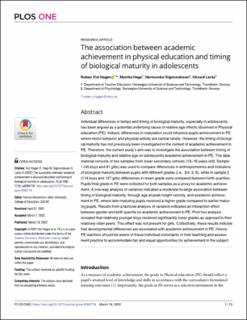| dc.contributor.author | Hagen, Ruben V. | |
| dc.contributor.author | Haga, Monika | |
| dc.contributor.author | Sigmundsson, Hermundur | |
| dc.contributor.author | Lorås, Håvard | |
| dc.date.accessioned | 2023-02-06T16:27:21Z | |
| dc.date.available | 2023-02-06T16:27:21Z | |
| dc.date.created | 2022-03-15T09:29:37Z | |
| dc.date.issued | 2022 | |
| dc.identifier.issn | 1932-6203 | |
| dc.identifier.uri | https://hdl.handle.net/11250/3048704 | |
| dc.description.abstract | Individual differences in tempo and timing of biological maturity, especially in adolescents, has been argued as a potential underlying cause of relative age effects observed in Physical education (PE). Indeed, differences in maturation could influence pupils`achievement in PE where motor behavior and physical activity are central tenets. However, the timing of biological maturity has not previously been investigated in the context of academic achievement in PE. Therefore, the current study`s aim was to investigate the association between timing of biological maturity and relative age on adolescents`academic achievement in PE. The data material consists of two samples from lower secondary schools (13–16 years old). Sample 1 (45 boys and 31 girls) was used to compare differences in anthropometrics and indicators of biological maturity between pupils with different grades (i.e., 3/4, 5, 6), while in sample 2 (114 boys and 127 girls) differences in mean grade were compared between birth quartiles. Pupils`final grade in PE were collected for both samples as a proxy for academic achievement. A one-way analysis of variance indicated a moderate-to-large association between timing of biological maturity, through age at peak height velocity, and academic achievement in PE, where later maturing pupils received a higher grade compared to earlier maturing pupils. Results from a factorial analysis of variance indicated an interaction effect between gender and birth quartile on academic achievement in PE. Post hoc analysis revealed that relatively younger boys received significantly lower grades as opposed to their relatively older peers. This effect was not present for girls. Collectively, these results indicate that developmental differences are associated with academic achievement in PE. Hence, PE teachers should be aware of these individual constraints in their teaching and assessment practice to accommodate fair and equal opportunities for achievement in the subject. | en_US |
| dc.language.iso | eng | en_US |
| dc.publisher | PLOS, Public Library of Science | en_US |
| dc.rights | Navngivelse 4.0 Internasjonal | * |
| dc.rights.uri | http://creativecommons.org/licenses/by/4.0/deed.no | * |
| dc.title | The association between academic achievement in physical education and timing of biological maturity in adolescents | en_US |
| dc.title.alternative | The association between academic achievement in physical education and timing of biological maturity in adolescents | en_US |
| dc.type | Peer reviewed | en_US |
| dc.type | Journal article | en_US |
| dc.description.version | publishedVersion | en_US |
| dc.source.volume | 17 | en_US |
| dc.source.journal | PLOS ONE | en_US |
| dc.source.issue | 3 | en_US |
| dc.identifier.doi | 10.1371/journal.pone.0265718 | |
| dc.identifier.cristin | 2009850 | |
| cristin.ispublished | true | |
| cristin.fulltext | original | |
| cristin.qualitycode | 1 | |

